. . . . . . . . . . . . . . . . . . . . . . . . . . . . .
. . .
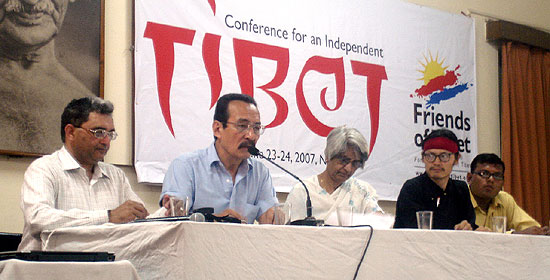
Shri Jamyang Norbu (Second from Left) makes
his presentation. Shri Vijay Kranti, Dr Niru Vora, Shri Tenzin Tsundue and
Shri Raghav Mittal next to him. Norbu, a member of a short-lived Tibetan
guerrilla movement that carried out raids from the Mustang Valley of Nepal
in the 1970s, said companies operating in China should be targeted to
force them to divest.
Tibet Activists Call For New Tactics
(AFP | June 26, 2007)
New Delhi: Tibetan activists Sunday called for new tactics in
the campaign for independence from China, saying attempts by spiritual
leader the Dalai Lama to engage Beijing were "not successful." Activists
said they would copy South Africa's anti-apartheid campaign by targeting
companies that do business with China, and would use next year's Beijing
Olympics to highlight the issue.
"You do one hunger strike in front of Yahoo headquarters in the United
States and see what happens," said veteran activist Jamyang Norbu,
referring to the US-based Internet portal. Tibetans in exile said attempts
by the Dalai Lama to negotiate greater autonomy for the Himalayan region
occupied by China in 1951 had yielded little and it was time to consider
new strategies. "It is not successful. The dialogue today is almost
finished," said Tenzin Tsundue, general secretary of the Friends of Tibet
exile group at a conference.
The Dalai Lama, who fled Tibet after a failed uprising against China in
1959, has campaigned for the six million Tibetans under Chinese rule from
the seat of his government-in-exile in the Indian town of Dharamshala. But
he has dropped calls for independence and called for a "middle way," which
the activists oppose.
"No one doubts his sincerity. But sincerity is not enough to get a
solution," said Tsundue, 32, who in 2002 unfurled a Tibetan flag from an
Indian hotel hosting a meeting between former Chinese premier Zhu Ronghji
and Indian business leaders. Norbu, 58, a member of a short-lived Tibetan
guerrilla movement that carried out raids from neighbouring Nepal in the
1970s, said companies operating in China should be targeted to force them
to divest. As well as Yahoo he mentioned Canada's Continental Minerals,
which is carrying out exploration in Tibet.
"China's power is eroding democracy all over the world," he said.
Activists also said they will also use next year's Beijing Olympics to
bring attention to their cause. This month five Americans unfurled a
Tibetan flag at Everest base camp, on the route of the Olympic torch
relay, prompting Chinese authorities to expel them and complain to
Washington.
Conference organisers also displayed for the first time a Tibetan
"passport" from 1947 bearing entry stamps from numerous countries to
challenge Chinese claims that the region was long a part of China.
. . . . . . . . . . . . . . . . . . . . . . . . . . . . . . . .
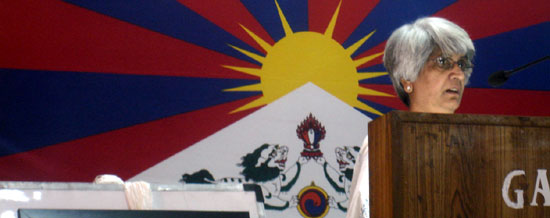
Dr Niru Vora, Director of Swarajpeeth makes
her presentation during the first 'Conference for an Independent Tibet' on
June 24, 2007. Dr Vora called upon the United Nations to fulfill its
obligation in view of its 1993 UN Declaration that there should remain no
colonized country in the world by the year 2000. (Photo: Friends of Tibet)
Tibetan Conference Gets Underway
(By Lipika Kamra | The
Indian Express | June 23, 2007)
New Delhi: The first ever "Conference for an independent Tibet"
began at the Gandhi Peace Foundation in New Delhi today. The two-day
conference, organised by Friends of Tibet (FOT), aims at bringing together
individuals and organisations who support the cause of Tibet's
independence from China, said organisers.
Noted Gandhian and educationist Rajiv Vohra, who inaugurated the
conference, said, "The very culture of Tibet has symbolised the concept of
Swaraj that Mahatma Gandhi had talked about."
Day one of the conference saw several eminent speakers, including
Lhasang Tsering, former president of the Tibetan Youth Conference, Radha
Bhatt, chairperson of the Gandhi Peace Foundation and Lawrence Liang,
legal researcher with the Alternative Law Forum presenting their points of
view. Vijay Crishna, an industrialist, gave an audio-visual presentation
based on his exploration of Tibet in 2006.
The highlight of the conference was the first-ever public display of a
"historic" passport of 1948, issued by the then government of Tibet. The
passport was recovered by "Friends of Tibet" from an antique dealer in
Nepal three years ago. The group looks at it as the proof of Tibet's
existence as an independent nation.
Alongside the conference, there was also an exhibition - Indian
Cartoonists on Tibet' - which showcased 30 selected cartoons on the
Tibetan issue and Sino-Indian relations from 1950-2005. Works of several
renowned cartoonists like Shankar, RK Laxman, Ravi Shankar and Yesudasan
were also on display.
"Friends of Tibet is the Indian support group for the Tibetan freedom
cause. This conference is an effort to explore the idea of independence
and to deliberate on the various practical ways and means to make Tibet a
free nation," said Tenzin Tsundue, general-secretary, FOT and
poet-activist.
. . . . . . . . . . . . . . . . . . . . . . . . . . . . . . . .
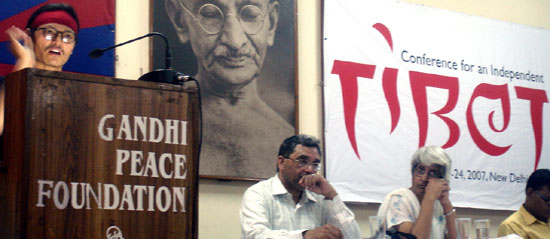
Shri Tenzin Tsundue, Tibetan Poet and
General Secretary of Friends of Tibet calls for Tibetan Independence. He
spoke on various practical ways and means to make Tibet a free nation.
(Photo: Friends of Tibet)
Tibetan Independence Claim Proved at Delhi Conference
(ANI
Correspondent | June 23, 2007)
London: Tibetan indpendence activists attending a conference
here have claimed that their country was independent right till 1950. The
activists have based their claim on a crumpled, faded and torn at the
edges sheet of paper that on closer inspection suggests the existence of a
Tibetan passport issued to the Dalai Lama's finance minister and used in
at least eight countries, including Britain, in 1948.
The document is on public display at the conference venue, reports The
Times. The independence activists say that this document is the strongest
evidence yet to support the Dalai Lama's longstanding claim that Tibet was
an independent nation before Chinese communist forces entered in 1950.
China says that Tibet has been an integral part of its territory for
centuries.
If the document is genuine, it supports the view that Tibet was at
least considered a de facto sovereign state by Britain and several other
countries. Type-print on the passport says that it was issued to Tsepon
Shakabpa, a Tibetan finance minister, who led a trade delegation to China,
India, the Middle East, Europe and the United States.
Friends of Tibet, an international group campaigning for Tibetan
independence, said it bought the document for 10,000 dollars (5,000
pounds) from an antique dealer in Nepal in 2003. "This is one document
that can prove Tibet's independence," Tenzin Tsundue, its general
secretary, told The Times.
"There is no way that it is a fake," he added. His group presented the
document in 2004 to the office of the Dalai Lama in Dharamsala. "The
passport is certainly genuine - Mr Shakabpa was very active in diplomacy,"
Thupten Samphel, a spokesman for the Dalai Lama, said. Shakabpa never
returned to Tibet after his mission, but settled in India and later
lobbied on behalf of the region at the United Nations, Samphel said. The
Dalai Lama will not attend this weekend's conference because its
organisers are still calling for independence.
. . . . . . . . . . . . . . . . . . . . . . . . . . . . . . . .
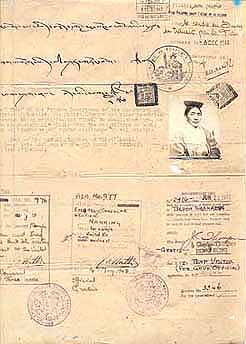
Click Here
to download a high-resolution image of the Tsepon Shakabpa passport
Historic Tibetan Passport to be on Display in Delhi
(June
21, 2007 | Press Trust of India)
New Delhi: A Tibet support group has claimed to have dug out a
passport of 1948 with visas of seven countries to "prove" the plateau
region's independence and its recognition by many nations. The passport of
Tsepon Shakabpa Wangchuk Dedhen, the Finance Minister of erstwhile Tibetan
government, was recovered by 'Friends of Tibet' from an antique dealer in
Nepal three years ago, the organisation said here.
The Tibetan group paid USD 10,000 to the dealer in Kathmandu, which
they raised mostly through donations from Tibetans in exile. The document,
which the group claims is "historic" and now in the possession of the
Dalai Lama, will be on display for two days in the capital this weekend.
The passport has visa stamps of seven countries - United States,
Britain, Switzerland, France, Italy, Egypt and Saudi Arabia - as he
visited these countries in 1948 as part of a Tibetan trade delegation.
They had passed through India while going abroad and coming back.
"The passport proves that Tibet was an independent country and it was
recognised by these countries," Tenzin Tsundue, General Secretary of
'Friends of Tibet', said here. The document will be on display at the
Gandhi Peace Foundation during the two-day 'Conference for an Independent
Tibet' beginning June 23, 2007.
. . . . . . . . . . . . . . . . . . . . . . . . . . . . . . . .
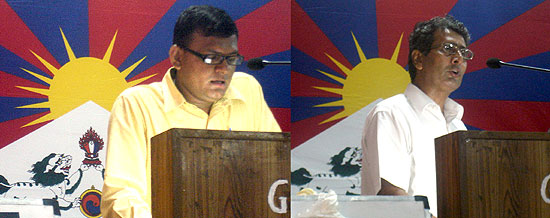
(Left) Shri Raghav Mittal of Bharat
Bandhu Network and (Right) Shri Iqbal Hadi Rizvi of Aligarh
Muslim University speak during the 'Conference for an Independent Tibet'
on June 24, 2007. (Photos: Friends of Tibet)
Conference for an Independent Tibet Gets Underway
(Phayul |
June 24, 2007)
New Delhi: Friends of Tibet today successfully inaugrated the
first ever conference for an Independent Tibet. Day one saw a packed hall
of two hundred, listening intently to Rajeev Vora, a prominent Gandhian
and founder of Swaraj Peeth, as he explained the true value of Tibet. "The
struggle for an Independent Tibet is a search for truth. And, this
struggle cannot be waged without testing our strength to test ourselves,
question ourselves". He inaugrated the Conference by unveiling the
Shakabpa passport. This passport is the only surviving legal document
proving Tibet's Independence recognized internationally.
After him, another prominent Gandhian, Radha Bhatt, Chairperson fo the
Gandhi Peace Foundation described the time when the borders between
Uttarkhand, where she grew up, and Tibet was almost non-existent. Cross
cultural exchange was constant and people felt free to move about the
borders, Suddenly, the movement was as good as stopped, what with all the
rigid rules and regulations. In Hindi she stated how "the need to free
Tibet is also the need to free India, give me back the culture I grew up
with."
Earlier in the day, the delegate-members of the Conference visited
Rajghat and began the sessions by saluting the contribution of Gandhi's
thought and practice to the non violent struggle being waged in and for
Tibet. Sethu Das, President, Friends of Tibet gave the welcome speech, by
raising questions like, "During the last two decades, some of the crucial
questions concerning the Tibetan struggle have found no answers - What is
the role played by the exiled Tibetan community and Tibet Support Groups
worldwide in the movements? Is there an attempts from a power centre to
divert people's attention from the issue of occupation to some unrealistic
issues? With no alternative thinking, does the debate on Tibet remain
merely at an intellectual level, without leading to any conclusion?"
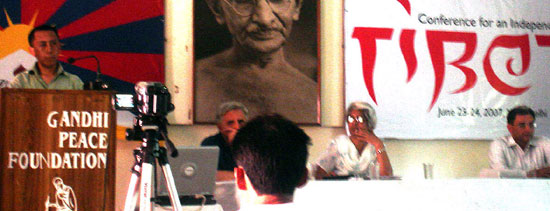
Shri Phuntsok Wangchuk, a former political prisoner from Chinese-occupied Tibet who was sentenced to five years imprisonment for
counter revolutionary activities narrates his prison experiences during the 'Conference for an Independent
Tibet' in New Delhi on June 24, 2007. (Photo: Friends of Tibet)
'Tibet of Our Minds: A Journey's End', an audio-visual presentation by
Vijay Crishna was the next session. Armed with an exhaustive slideshow of
images which historically documented the changing nature of Tibet, Vijay
Crishna spoke at length about the way Tibet has been seen by the outside
world, how the chinese colonization is leaving its imprints on the
people,culture, water and soil.
The afternoon session had Lhasang Tsering, former President of the
Tibetan Youth Congress deplore the Middle Way approach of the Dalai Lama,
which seeks genuine autonomy within China. "Where is the need for China to
talk to a bunch of refugees? The Strassbourg Resolution of 1988 has
divided the Tibetans, it has confused them and we are still thinking about
which path to follow, when time is running out for Tibet." He also
mentioned how "there is a certain loss of a pain with death", but if
today, Tibet is lost, it would mean peril for India. Even while thanking
India for the support it has been showing since 1959, he warns India of
the scenario in which it shares a permanent border with China. "I want to
take one step forward, even if it is wrong."
Lawrence Liang, Legal Researcher of Alternative Law Forum, Banglore
started his talk on a very personal note. "My parents are chinese who ran
a noodle shop in Banglore and Tibetans would visit the shop often and ask
me whether I was Tibetan or not. I have been to Dharamsala and met some
Tibetans who had crossed over. I was often asked the question, "Gyami re?"
and I would answer
"Gyagar Gyami". He then contextualized Tibet's right to self
determination in a time when the concept of nation state itself is
contested. He explained how there is growing gap between the real world of
International Relations and normative world of International Law. The
Tibetan claim to nationhood falls in this gap. The international community
has weakend Tibet's case by recognizing China's defacto sovereignty over
Tibet as de jure sovereignty. The Dalai Lama's stand of seeking autonomy
further hurts Tibet's case as it was a move from reclaiming the right to
external sovereignty to internal self determination.
The first day of the conference thus tried to understand Tibet's case
for Independence through a varied lens. It was able to expand the various
possibilities which have remained un talked about till now.
. . . . . . . . . . . . . . . . . . . . . . . . . . . . . . . .
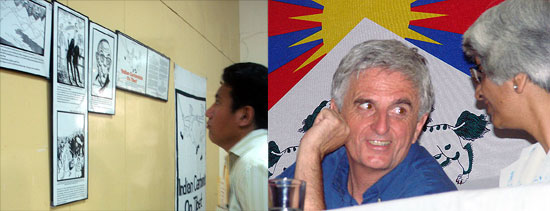
(Left) A visitor at 'Indian Cartoonists
on Tibet' exhibition during the 'Conference for an Independent Tibet'.
(Right) French Tibetologist Shri Claude Arpi in conversation
with Dr Niru Vora of Swarajpeeth. (Photos: Friends of Tibet/Phayul)
We Shall Overcome
(7DAYS, United Arab Emirates | June 24,
2007)
New Delhi: Tibetan activists yesterday called for new tactics in
the campaign for independence from China, saying attempts by spiritual
leader the Dalai Lama to engage Beijing were "not successful". Activists
said they would copy South Africa’s anti-apartheid campaign by targeting
companies that do business with China, and would use next year's Beijing
Olympics to highlight the issue.
"You do one hunger strike in front of Yahoo headquarters in the United
States and see what happens," said veteran activist Jamyang Norbu,
referring to the US-based internet portal. "Western institutions are open
to embarrassment." Tibetans in exile said attempts by the Dalai Lama to
negotiate greater autonomy for the Himalayan region occupied by China in
1951 had yielded little and it was time to consider new strategies.
"It is not successful. The dialogue today is almost finished," said
Tenzin Tsundue, General Secretary of the Friends of Tibet group at a
conference. The Dalai Lama, who fled Tibet after a failed uprising against
China in 1959, has campaigned for the six million Tibetans under Chinese
rule from the seat of his government-in-exile in the Indian town of
Dharamshala.
But he has dropped calls for independence and called for a "middle
way", which the activists oppose. "No one doubts his sincerity. But
sincerity is not enough to get a solution," said Tsundue, 32, who in 2002
unfurled a Tibetan flag from an Indian hotel hosting a meeting between
former Chinese premier Zhu Ronghji and Indian business leaders.
Norbu, 58, a member of a short-lived Tibetan guerrilla movement that
carried out raids from neighbouring Nepal in the 1970s, said companies
operating in China should be targeted to force them to divest. "China's
power is eroding democracy all over the world," he said.
Activists also said they will also use next year's Beijing Olympics to
bring attention to their cause. This month five Americans unfurled a
Tibetan flag at Everest base camp, on the route of the Olympic torch
relay, prompting Chinese authorities to expel them and complain to
Washington. Conference organisers also displayed for the first time a
Tibetan 'passport' from 1947 bearing entry stamps from numerous countries
to challenge Chinese claims that the region was long a part of China.
. . . . . . . . . . . . . . . . . . . . . . . . . . . . . . . .
Tibet Is A Colonised Country, Not Only An Occupied Territory: Delhi Conference
(Phayul, June 28, 2007)
New Delhi: The first ever conference on Tibetan Independence organised by Friends of Tibet (India) - an Indian Tibet support group concluded meaningfully after much debate and discussions shaping a sharper point of view on the Independence as the goal of the Tibetan struggle and how to make it happen.
The Conference held at the Gandhi Peace Foundation, New Delhi from 23 to 24 June 2007, was attended by more than 300 people, mostly Indians from all walks of life, including a sizeable number the Intelligence who sat through out the conference like well mannered school kids. On the concluding second day early morning, over two hundred Indians and Tibetans listened to Jamyang Norbu, noted Tibetan writer and veteran activist who stands for complete independence of Tibet, as he explained how the next two years are crucial for Tibet, and how the "Olympics could provide the one-chance for Tibetans to come out and protests like one mighty force". He noted that unless a mass protest occurs, Tibet would continue to slip out of the world map, leaving very little to protest for.
Saying attempts by spiritual leader the Dalai Lama to engage with Beijing were "not successful", Jamyang called for new tactics in the campaign for independence from China. "You do one hunger strike in front of Yahoo headquarters in the United States and see what happens," said the ardent activist. He stated that companies operating in China should be targeted to force them to divest. The Tibetan writer and celebrity activist spoke in style and distinct of his personality without mincing words. For many Tibetan youngsters who were sitting on the floor, due to limited chairs, it was their first experience to hear Jamyang Norbu speak with such vigorous drive.
Niru Vora, prominent Gandhian and a former professor in the school of Chinese and Japanese Studies of Delhi University, stated, "Tibet is a colonised country, and not just an occupied territory." The usage of occupied territory implies the forced presence of an army, but the situation in Tibet is far more complex and worse, wherein it has been colonised culturally, economically and not just taken over by the Chinese army when it was a full-fledged nation in 1959.
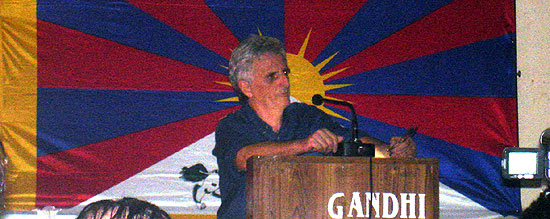
French Tibetologist and writer Shri Claude
Arpi presents his views during the 'Conference for an Independent
Tibet' in New Delhi on June 24, 2007. (Photo: Friends of Tibet)
The organisers were surprised with more than triple the number of people expected turning up for the conference. As the sessions were many and there was no end to the flow of questions, tea breaks were forgiven and sessions had to be stretched for hours.
Chairperson Vijay Kranti said "Now our hero will speak". There was a spark of alertness in the hall as Tibetan poet and activist Tenzin Tsundue was invited to speak. In his distinct red-band and black-shirt he spoke with conviction and emotionally connecting to the audience. He said "though our political stand is different from His Holiness the Dalai Lama, our commitment to Non-violence is same. But non-violence without mass support will not succeed". Responding to questions he said "we appeal to all parties involved to reconsider their investments in China and Tibet. Your business is destroying our country." Citing the South African example of success of mass movement, he said "Only when corporate interests of Coca-Cola, IBM and scores of others were hurt then they put pressure on the white government to relent. We will now devise to do this. If our non-violence fails, we will have to find other means. The international community has the responsibility to support and make the Tibetan struggle succeed."
The other noted speakers on the day, Vijay Kranti, prominent journalist and a long time supporter of an Independent Tibet, Claude Arpi, French researcher and Tibet commentator, Raghav Mittal of Bajaj Foundation also argued for Rangzen. Arpi presented historical and legal documents, which proved Tibet's nationhood and contextualised the seventeen-point agreement and the Strasbourg Proposal. Out of thirteen speakers of the conference, eight of them questioned the validity of Middle Way Approach seeking Autonomy, saying "when China repeatedly rejected this proposal why does it continue to be the policy of the Tibetan Government in Exile?"
Phuntsok Wangchuk, former political prisoner and the General Secretary of Gu-Chu-Sum movement of soeaking in Tibetan, related his experiences of life in prison and the atrocities committed by the Chinese authorities. On the whole he gave the picture of freedom struggle inside Tibet today. When asked what the Tibetans inside Tibet want, he stated confidently that the Tibetans inside Tibet are working for Independence, and nothing else. He said if the hundreds of prisoners submit their loyalty to the Chinese authorities, within five minutes they would be released. "They never give up on Independence and the prisoners continue to languish in prison for many years, some of which more than 20 years," he said. His speech received maximum applause from the audience.
Heated discussion marked the second day of the conference, some of which reflected huge differences in political and ideological point of view.
Indian supporters coming from right-wing Hindu Nationalist, Leftist, Liberal Leftist and Marxist and also a good number of Gandhians and followers of Jayprakash Narayan only goes on to prove the variety of Tibet supporters and backgrounds they come from. Naturally their perspectives would lock horns and they did. However, everyone stood firmly on the stance of Independence of Tibet acknowledging the view Radha Bhatt expressed "Jab tak Tibbat Azaad nahin hai, India kabhi azaad nahin ho sakta. India hamesha Chin ki Dabao main rehne padega" (As long as Tibet is not free, India can never be free. India will have to forever live under Chinese pressure).
Radha Bhatt is a Gandhian, an activist who hugged trees to save them from felling during the 1980s famous Chipko Movement of North India.
The Conference was attended by many prominent journalists, lawyers, and defence strategists, and intellectuals of the country, like Parth Shah of the Centre of Civil Society, Colin Gonzalves, founder of the Human Rights Law Network, Harsh Dhobal, editor Combat Law, Madhur Santanam Sondhi, Major Gen (Retd) Vinod Saighal, Dr Trika of Core Group for Tibet, Sonam Wangdue of US Tibet Committee were among others. Many young Tibetans and Indians attended the conference with great attention and sat through five sessions that spread into two days. International participants from USA, France, the UK and Poland and Indian participants from more than 20 states made to the conference. Tibetan participants came from Dharamshala, Kollegal, Bangalore, Dimapur and Dehradoon at their own expenses. Dharma Bums and JJI Exile Brothers presented Rangzen songs. Besides receiving support letters from various International Tibet support bodies, Claudia Roth, Federal Chairwoman of Green Party and Member of Federal Parliament, Germany and George Fernandes, former Defence Minister of India had sent a letter of support to the conference. Dr Niru Vora, who has been closely associated in organising the conference with Friends of Tibet, chaired the final session and also presented the Conference Resolution.
. . . . . . . . . . . . . . . . . . . . . . . . . . . . . . . .
Two-Day Tibet Conference Ends
(By Lipika Kamra | The Indian
Express | June 24, 2007)
New Delhi: A Two-day 'Conference for an Independent Tibet',
organised by Friends of Tibet (FOT), ended today with the participants
resolving to to 'call upon all Tibetan support groups around the world to
aim at complete independence from China' as their principal goal. The
resolution also mentions calling upon the United Nations to fulfill its
obligation of ensuring 'no colonisation in the world'.
Tenzin Tsundue, poet-activist and General-Secretary of Friends of
Tibet, Niru Vora, expert on Chinese and Japanese studies, Jamyang Norbu,
renowned Tibetan writer and Phuntsok Wangchuk, former Tibetan political
prisoner were among the key speakers on Sunday.
"For us, freedom of Tibet means everything. It is because of this hope
of freedom that I exist. We want an independent Tibet and that is our
sacred goal," said Tsundue. Talkin about the conditions of political
prisoners in Tibet, Phuntsok Wangchuk said, "There is a growing awareness
of human rights and its violations worldwide, but the situation in Tibet
is getting worse."
French Writer Claude Arpi presented several documents he procured from
the British Government archives which 'documented' that Tibet existed as a
fully independent nation before Chinese occupation in 1951.
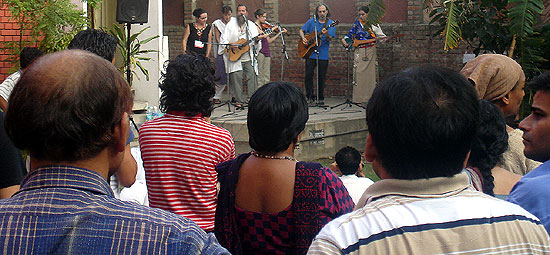
Team Dharma Bums Performs during the
'Conference for an Indenpendence Tibet' at the Gandhi Peace Foundation on
June 23, 2007. Founded by songwriter-activist Phil Void in the early 70s,
the 'Dharma Bums' has performed all over the world for cause of a Free
Tibet. The group was started as a loose collection of musicians seeking
enlightenment. JJI Exile Brothers, a popular Tibetan music and solo
Tibetan singer Jampa also performed during the 'Conference for an
Independent Tibet'. (Photo: Friends of Tibet)
. . . . . . . . . . . . . . . . . . . . . . . . . . . . . .
. .
'Conference for an Independent Tibet' (June 23-24, 2007, New
Delhi)
CONFERENCE RESOLUTION:
The Conference called for recognizing Tibet as a colony and that the
United Nations and other bodies of the International community be
compelled to remove the last vestiges of colonialism, and grant demand of
Independence for Tibet. It cited the Resolution number "49/89
Implementation of the Declaration on the Granting of Independence to
Colonial Countries and Peoples" of 7th February 1995 adopted by the
General Assembly of the United Nations as follows: "Having examined the
report of the Special Committee on the Situation with regard to the
Implementation of the Declaration on the Granting of Independence to
Colonial Countries and Peoples, 1/Recalling its resolution 1514(XV) of 14
December 1960, containing the Declaration on the Granting of Independence
to Colonial Countries and Peoples, and all its subsequent resolutions
concerning the implementation of the Declaration, most recently resolution
48/52 of 10 December 1993, as well as the relevant resolutions of the
Security Council, Recognizing that the eradication of colonialism is one
of the priorities of the Organization for the decade that began in 1990,
Deeply conscious of the need to take, speedily, measures to eliminate the
last vestiges of colonialism by the year 2000, as called for in its
resolution 43/47 of 22 November 1988 ."
The above-cited resolution, ratified even by China, makes it the moral
responsibility of the UN and the member nations of this body to call a
special meeting of the General Assembly and impress upon China that in
view of this Resolution, China must restore full independence to whole of
Tibet i.e. all the three provinces and its people.
The Conference adopted a four-point resolution, which will guide its
call for Independence of Tibet and its plan of action in the coming years:
RESOLUTION
"Realizing that Complete Independence (Poorna Swaraj) under the
leadership of His Holiness the Dalai Lama and with the help of India and
other members of the freedom-loving world community is the only hope for
Tibet, the Conference RESOLVES:-
1) To call upon the Government of India to recognize the Tibetan
Government-in-Exile as the sole legitimate Government of Tibet and the
Tibetan people and His Holiness the Dalai Lama as its sole political and
spiritual leader.
2) To call upon the United Nations to fulfill its obligation in view of
its 1993 UN Declaration that there should remain no colonized country in
the world by the year 2000.
3) To call upon every member of the international community to
recognize Tibet as one of the last remnants of colonial rule in need of
decolonization.
4) To call upon all Tibet Support Groups around the world to put back
Complete Independence as their main agenda in their campaigns and observe
22 November every year as "Anti-Colonialism Day" and to run signature
campaigns reminding the United Nations to implement its resolutions on
Colonialism."
. . . . . . . . . . . . . . . . . . . . . . . . . . . . . . . .

Friends of Tibet, PO Box 16674, Bombay 400050, India.
Friends of Tibet is a people's movement to keep alive the issue of
Tibet through direct action. Our activities are aimed at ending China's
occupation of Tibet and the suffering of the Tibetan people. Friends of
Tibet supports the continued struggle of the Tibetan people for
independence.